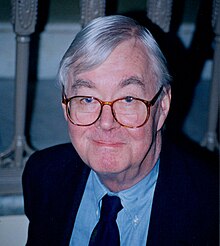
Back دانيال باتريك موينيهان Arabic دانيال باتريك موينيهان ARZ دانیل پاتریک موینیهان AZB Daniel Patrick Moynihan Catalan Daniel Patrick Moynihan Czech Daniel Patrick Moynihan German Daniel Patrick Moynihan Esperanto Daniel Patrick Moynihan Spanish دانیل پاتریک موینیهان Persian Daniel Patrick Moynihan French
Daniel Patrick Moynihan | |
|---|---|
 Moynihan in 1998 | |
| United States Senator from New York | |
| In office January 3, 1977 – January 3, 2001 | |
| Preceded by | James Buckley |
| Succeeded by | Hillary Clinton |
| Chair of the Senate Finance Committee | |
| In office January 3, 1993 – January 3, 1995 | |
| Preceded by | Lloyd Bentsen |
| Succeeded by | Bob Packwood |
| Chair of the Senate Environment Committee | |
| In office September 8, 1992 – January 3, 1993 | |
| Preceded by | Quentin Burdick |
| Succeeded by | Max Baucus |
| 12th United States Ambassador to the United Nations | |
| In office June 30, 1975 – February 2, 1976 | |
| President | Gerald Ford |
| Preceded by | John Scali |
| Succeeded by | Bill Scranton |
| 10th United States Ambassador to India | |
| In office February 28, 1973 – January 7, 1975 | |
| President | Richard Nixon Gerald Ford |
| Preceded by | Kenneth Keating |
| Succeeded by | Bill Saxbe |
| Counselor to the President | |
| In office November 5, 1969 – December 31, 1970 | |
| President | Richard Nixon |
| Preceded by | Arthur Burns |
| Succeeded by | Donald Rumsfeld |
| White House Urban Affairs Advisor | |
| In office January 23, 1969 – November 4, 1969 | |
| President | Richard Nixon |
| Preceded by | Joe Califano (Domestic Affairs) |
| Succeeded by | John Ehrlichman (Domestic Affairs) |
| Personal details | |
| Born | March 16, 1927 Tulsa, Oklahoma, U.S. |
| Died | March 26, 2003 (aged 76) Washington, D.C., U.S. |
| Political party | Democratic |
| Spouse |
Elizabeth Brennan (m. 1955) |
| Children | 3 |
| Relatives | Michael Avedon (grandson) |
| Education | City College of New York Tufts University (BS, BA, MA, PhD) London School of Economics |
| Military service | |
| Allegiance | United States |
| Branch/service | United States Navy |
| Years of service | 1944–1947 |
| Rank | Lieutenant (junior grade) |
| Unit | USS Quirinus (ARL-39) |
Daniel Patrick Moynihan (March 16, 1927 – March 26, 2003) was an American politician and diplomat. A member of the Democratic Party, he represented New York in the United States Senate from 1977 until 2001 after serving as an adviser to President Richard Nixon, and as the United States' ambassador to India and to the United Nations.
Born in Tulsa, Oklahoma, Moynihan moved at a young age to New York City. Following a stint in the navy, he earned a Ph.D. in history from Tufts University. He worked on the staff of New York Governor W. Averell Harriman before joining President John F. Kennedy's administration in 1961. He served as an Assistant Secretary of Labor under Presidents Kennedy and President Lyndon B. Johnson, devoting much of his time to the War on Poverty. In 1965, he published the controversial Moynihan Report on black poverty. Moynihan left the Johnson administration in 1965 and became a professor at Harvard University.
In 1969, he accepted Nixon's offer to serve as an Assistant to the President for Domestic Policy, and he was elevated to the position of Counselor to the President later that year. He left the administration at the end of 1970, and accepted appointment as United States Ambassador to India in 1973. He accepted President Gerald Ford's appointment to the position of United States Ambassador to the United Nations in 1975, holding that position until early 1976; later that year he won election to the Senate.
Moynihan served as Chairman of the Senate Environment Committee from 1992 to 1993 and as Chairman of the Senate Finance Committee from 1993 to 1995. He also led the Moynihan Secrecy Commission, which studied the regulation of classified information. He emerged as a strong critic of President Ronald Reagan's foreign policy and opposed President Bill Clinton's health care plan. He frequently broke with liberal positions, but opposed welfare reform in the 1990s. He also voted against the Defense of Marriage Act, the North American Free Trade Agreement, and the Congressional authorization for the Gulf War. He was tied with Jacob K. Javits as the longest-serving Senator from the state of New York until they were both surpassed by Chuck Schumer in 2023.
© MMXXIII Rich X Search. We shall prevail. All rights reserved. Rich X Search